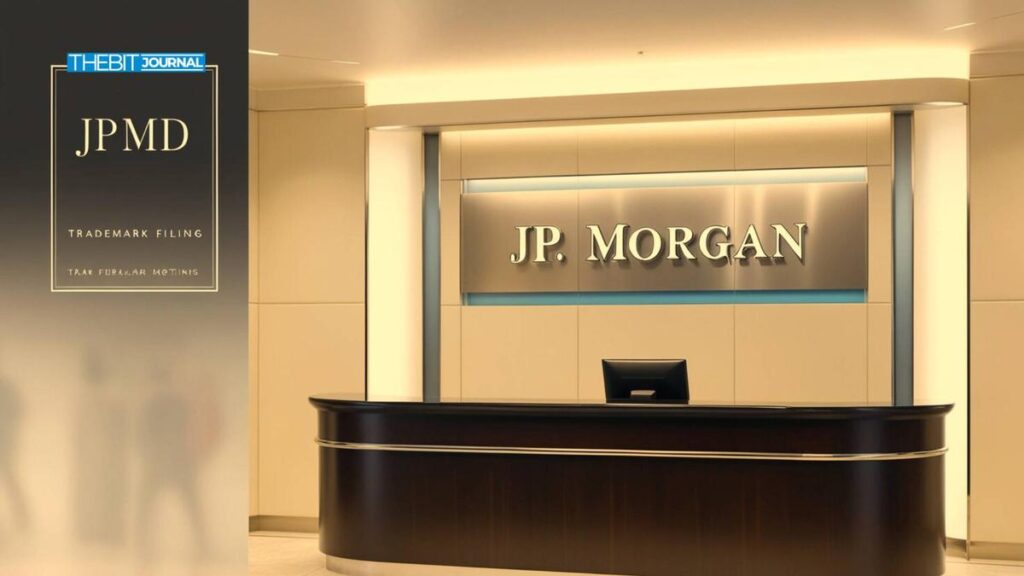JPMorgan Files ‘JPMD’ Trademark: Is a New Stablecoin on the Horizon?
The US biggest bank, JPMorgan Chase, is again in the limelight within the world of digital assets. On June 15, the bank filed a brand-new trademark application for ‘JPMD’ with the United States Patent and Trademark Office (USPTO), which has raised widespread speculations among the crypto community about its stablecoin plans. The filing of the trademark indicates a range of services, including issuing digital currency, managing electronic payments, trading digital tokens, and financial custody. While ‘stablecoin’ wasn’t explicitly mentioned in the filing, experts and users alike are interpreting the filing as a sign that JPMorgan is preparing to launch a new token—a retail-focused or institution-grade stablecoin, possibly.
What the ‘JPMD’ Filing Suggests
According to the USPTO listing, ‘JPMD’ would be associated with an array of blockchain-based services such as trading, exchanging, transferring, and payment processing of digital assets. This broad slate suggests higher integration of blockchain technology into its mainstream financial services by JPMorgan. The bank itself has made no official statements on the trademark, but the timing of the application has led some to link it with JPMorgan’s previously reported involvement in discussions of a joint stablecoin project with other major U.S. banks, including Bank of America, Citigroup, and Wells Fargo. The project, if executed, would potentially serve as a competitor to crypto-native stablecoins like USDT or USDC, offering faster cross-border payments and settlement options.
A History of Blockchain Adoption
JPMorgan does not lack a history when it comes to blockchain technology. In 2019, the bank launched JPM Coin, a permissioned blockchain token that settles institutional client trades. JPM Coin operates on the Quorum blockchain, initially developed by JPMorgan and is based on Ethereum’s architecture. By 2023, the platform was reported to be processing over $1 billion worth of transactions daily. Additionally, JPMorgan’s blockchain-based payments platform, Kinexy (formerly Onyx), has facilitated over $1.5 trillion of interbank payments using JPM Coin. These milestones demonstrate the bank’s interest in leveraging blockchain to make sense of traditional finance while maintaining a safe distance from public cryptocurrencies.
Shifting Tone on Crypto
Speculation of a potential new stablecoin release follows a notable shift in tone by JPMorgan officials. CEO Jamie Dimon has long been among Wall Street’s most vocal critics of Bitcoin and the broader crypto space. Dimon previously referred to Bitcoin as ‘useless’ and went as far as to state that its most valuable use was for criminal activities. However, recent developments indicate a more pragmatic approach. Last month, Dimon mentioned that JPMorgan would allow clients to buy Bitcoin, but the bank would not hold the cryptocurrency in its custody. This shift may be part of an industry-wide trend within U.S. financial institutions as the regulatory environment for digital assets becomes more welcoming.
Stablecoin Legislation Advances in the U.S.
JPMorgan’s trademark filing also coincides with a significant advancement on the U.S. legislative front. The Guiding and Enhancing National Innovation for United States Stablecoins (GENIUS) Act recently passed a Senate test, with a 68-30 vote. If the bill clears Congress and is signed into law by President Donald Trump, it would establish a regulatory framework for stablecoin issuance and management in the United States. The passage of the bill could provide the clarity that major banks like JPMorgan need to expand digital asset offerings without navigating through regulatory uncertainties.
Institutional Demand for Stablecoins
JPMorgan is not alone in exploring stablecoins. Fidelity, a wealth manager, recently announced that it was ‘actively exploring’ a stablecoin but had no immediate plans to launch one. Other major tech firms including Meta, Apple, Google, and Airbnb are reportedly investigating stablecoin use cases for cross-border payments and content creator payments. These developments signal an increased recognition of stablecoins as a strategic tool to expedite settlement speeds and offer a hedge for fiat currency in high-inflation economies.
As the global digital asset landscape evolves further, JPMorgan’s latest move with the ‘JPMD’ trademark suggests the bank is gearing up to play a significant role in the future of blockchain-backed financial infrastructure—potentially even introducing its own stablecoin offering. Whether ‘JPMD’ becomes a cornerstone of the future remains to be seen, but the industry will be monitoring closely.
Frequently Asked Questions
What is JPMD? JPMD is a recently filed trademark by JPMorgan Chase, potentially associated with digital asset services such as trading, payment processing, and possibly a new stablecoin product.
Is JPMorgan releasing a stablecoin? While the trademark filing itself does not specify a stablecoin, it has sparked speculation due to the timing and general descriptions of digital asset services. JPMorgan currently operates JPM Coin, a stablecoin for institutional clients.
What services might JPMD offer? Based on the USPTO filing, JPMD may provide services including digital asset trading, electronic payments, digital currency issuance, and custody based on blockchain technology.
Why is JPMorgan venturing here now? The development comes as the industry is increasingly showing interest in stablecoins, and as the U.S. progresses with the GENIUS Act, which could regulate stablecoin usage and create a more secure legal environment for banks.
How does this impact the crypto space? If JPMorgan introduces a stablecoin or expands its blockchain offerings, it could stimulate institutional adoption and competition, reshaping how traditional and digital financial systems interact.
Glossary of Key Terms
Stablecoin: A cryptocurrency pegged to a stable asset like the U.S. dollar to mitigate volatility.
Trademark Filing: A legal filing with the USPTO to protect the name or symbol of a product or service—in this case, ‘JPMD.’
Blockchain: A decentralized digital ledger of transactions across a network of computers, widely used in cryptocurrency and fintech.
JPM Coin: JPMorgan’s existing dollar-backed stablecoin used for real-time interbank settlement on its private Quorum blockchain.
GENIUS Act: An upcoming U.S. bill aimed at regulating the issuance and governance of stablecoins, paving the way for increased institutional involvement in crypto.
Sources: JPMD, United States Patent and Trademark Office (USPTO), Defillama, Fortune


